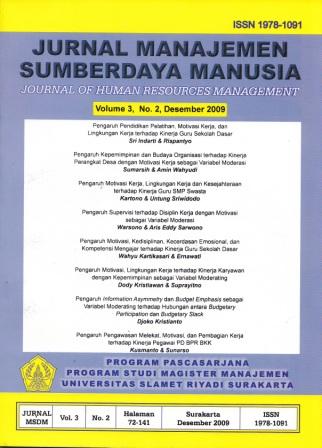PENGARUH INFORMATION ASYMMETRY DAN BUDGET EMPHASIS SEBAGAI VARIABEL MODERATING TERHADAP HUBUNGAN ANTARA BUDGETARY PARTICIPATION DAN BUDGETARY SLACK
Abstract
ABSTRACT
The influence between budgetary participation and budgetary slack and information asymmetry and budget emphasis has been examined in several accounting studies with conflicting result. The conflicting evidence may reflect the influence of a contingent variable. This study examined influenced of budget participation as moderate variable in the information asymmetry and budget emphasis to budgetary slack.The sample of this research executed with mail survey method. The total 500 of questionnaires have been given to the population of this research, that are the manager of manufactur company in Indonesia, only 97 questionnaires back and ready to analyze. The result of study showed that budgetary participation and budgetary slack had negative and significant influence. The result also showed that of fit between budgetary participation and contingent variable information asymmetry decreased propensity to create budgetary slack. Otherwise, the result of study about the influence of fit between budgetary participation and contingent variable budget emphasis showed negatif and not significant to budgetary slack.
Keywords : budgetary participation, information asymmetry, budget emphasis, budgetary slack, residual analysis.
Downloads
Published
How to Cite
Issue
Section
License
Authors who publish this journal agree to the following terms:
- Authors retain copyright and grant the journal right of first publication with the work simultaneously licensed under a Creative Commons Attribution License that allows others to share the work with an acknowledgement of the work's authorship and initial publication in this journal.
- Authors can separately make additional contractual arrangements for non-exclusive distribution published by the journal (e.g., publish it in a book), with an acknowledgement of its initial publication in this journal.
- Authors are allowed and encouraged to send their work via online (e.g., in the institutional repositories or their website) after published by the journal.













 Â
 
